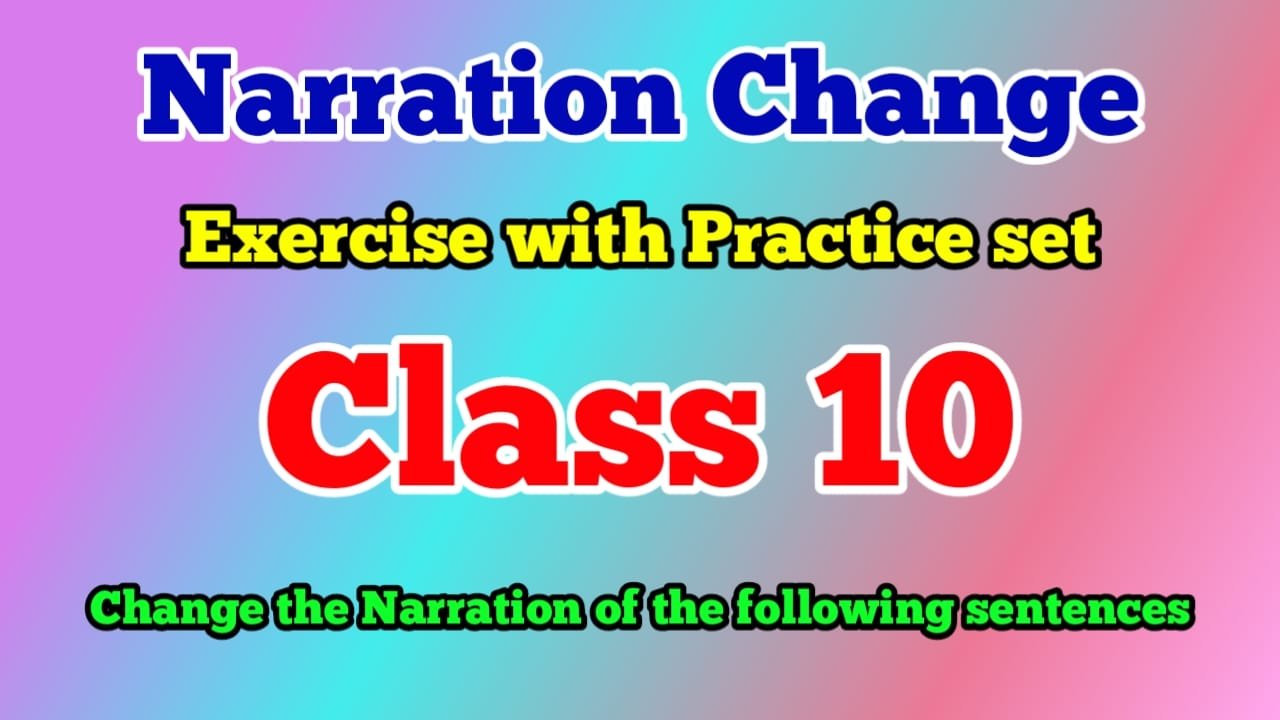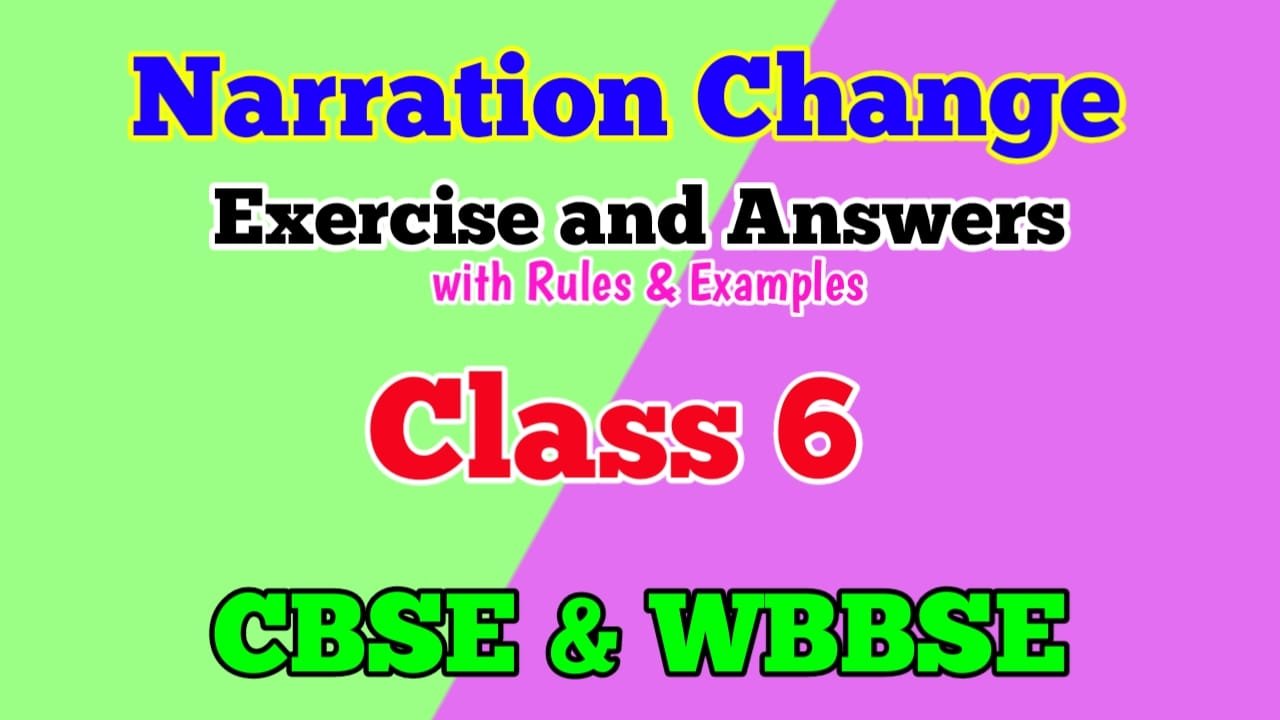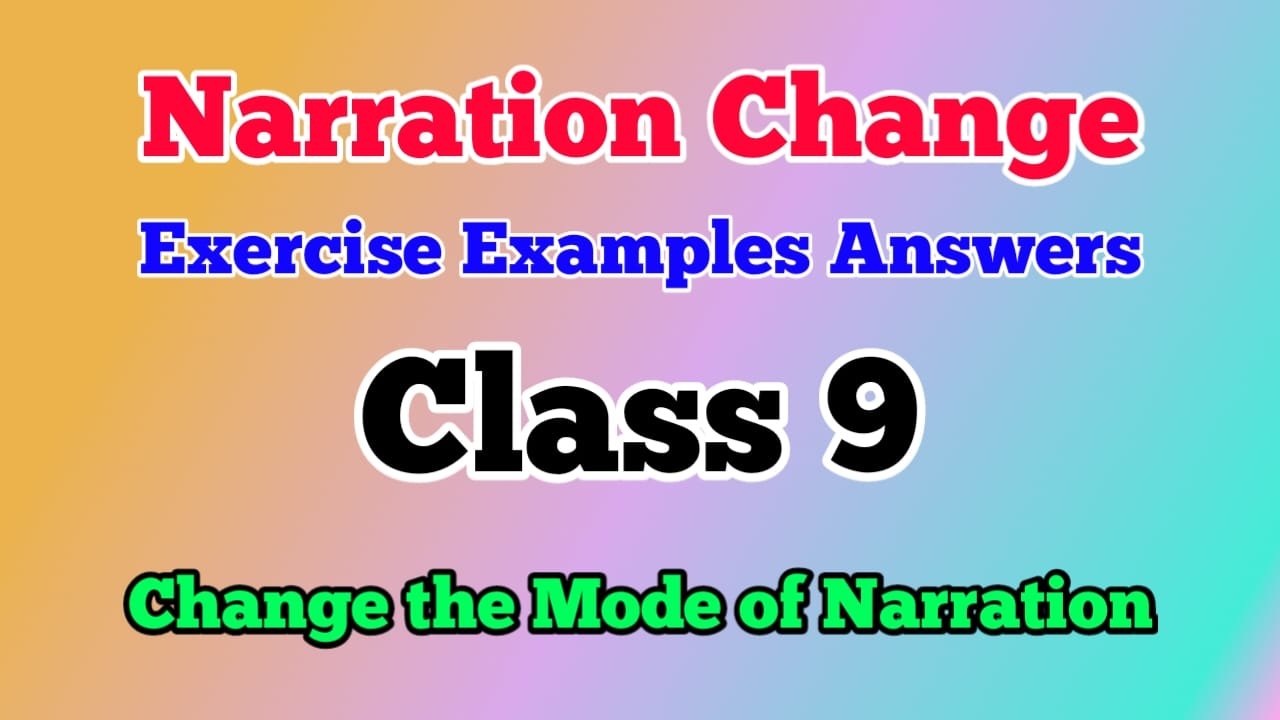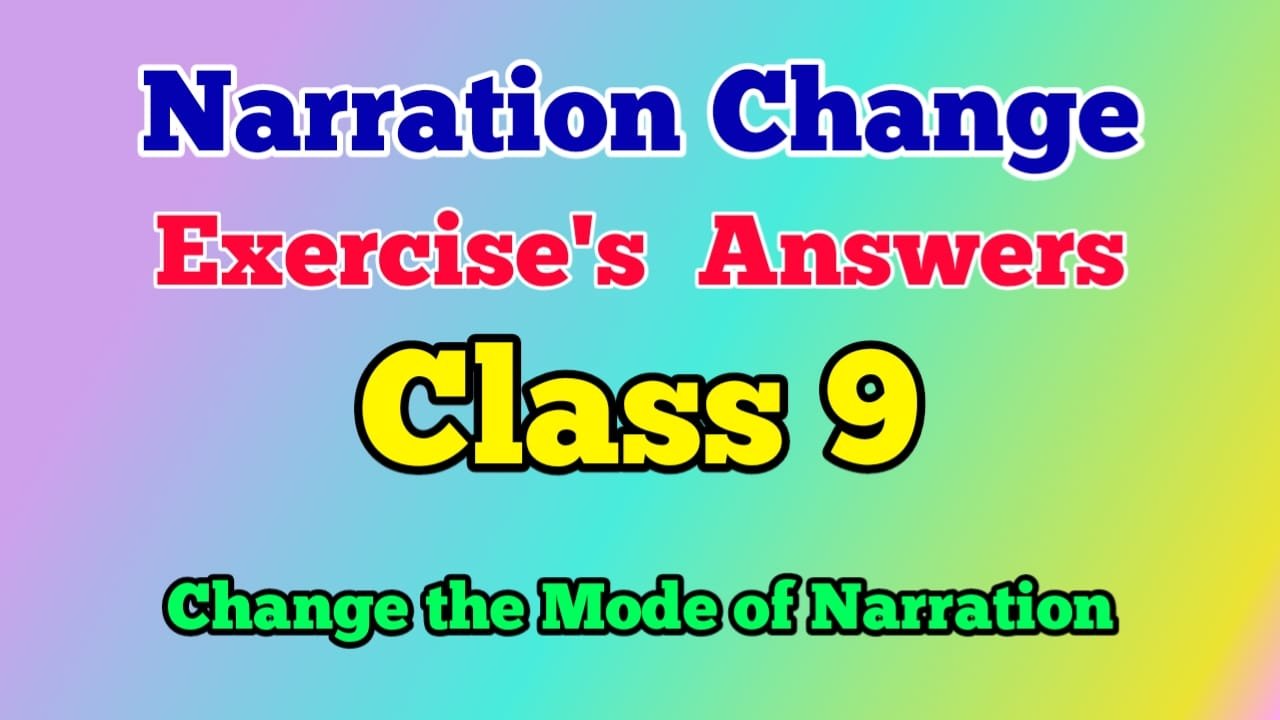Narration Change Class 7 is the topic in English Grammar that each and every student must know. Learn Class 7 Narration Change rules, examples, and exercises that are shown in the following.
Narration is of two types. When we quote the speaker’s actual word directly, it is Direct Narration. When we speak the speaker’s actual words indirectly without quoting his exact words, it is called Indirect Narration.
Understanding Narration Change for Class 7
Doing narration change class 7, we have to understand what narration change is. Narration Change means to speak or write the speaker’s words from the Direct way to the Indirect way and vice versa.
In Narration Change, the speaker’s actual words are called Direct Speech and when someone narrates the speaker’s actual words indirectly but keeps the meaning the same, they are called Indirect Speech.
Narration Change Examples
Direct: He said to me, “I am playing football.”
Indirect: He told me that he was playing football.
Direct: Soma said to him, “You gave me this pen.”
Indirect: Soma told him that he had given her that pen.
Direct: The boy said, “Is there any hope?”
Indirect: The boy asked if there was any hope.
Direct: Mother said, “Be quiet.”
Indirect: Mother ordered (me) to be quiet.
Direct: She said, “Let us go home.”
Indirect: She suggested that they should go home.
Study the following pictograph of examples of narration change.

Now, go through the rules that we need to know to change Direct speech to Indirect speech as mentioned below.
People also search
| Narration Change Class 5 | Narration Change Class 8 |
| Narration Change Class 6 | Narration Change Class 9 |
| Narration Change Class 7 | Narration Change Class 10 |
Rules of Narration Change Class 7.
The following examples will show the changes in the Rules from Direct Narration to Indirect Narration. Understanding direct and indirect speech is crucial for clear and effective communication. Here are the essential rules you need to know, especially for class 7.
A. Reporting Verbs Rules
B. Tenses Rules
C. Pronouns Rules
D. Punctuation Marks Rules
E. Modals Rules
F. Modifying Words Rules
A. Reporting Verbs Rules
Common Reporting Verbs: Said, told, asked, explained, etc.
Usage: Choose the correct verb to match the context of the sentence.
Examples:
| Direct: He said, “I am tired.” Indirect: He said that he was tired. |
| Direct: He said to me, “Are you ill?” Indirect: He asked me if I was ill. |
| Direct: The teacher said to the students, “Keep quiet” Indirect: The teacher ordered the students to keep quiet. |
| Direct: He said, “May you live long.” Indirect: He wished that I might live long. |
B. Changes of Tense Rules for Class 7
Tense Shifts: Present to past, present perfect to past perfect, etc.
Examples:
| Direct: He said to (past tense) me, “You are ( present Tense) coward.” Indirect: He told (past tense) me that I was a (past tense) coward. |
| Direct: Mother said to (past tense) me, “You did not work(past tense) hard.” Indirect: Mother told (past tense) me that I had not worked ( past perfect tense) hard. |
| Direct: He will say to (future tense) you, “I have done (present tense)well.” Indirect: He will tell (future tense) you that he has done(present tense) well. |
| Direct: The teacher said (past tense), “The earth moves (present tense) round the sun.” Indirect: The teacher said (past tense), that the earth moves (present tense) around the sun. (universal truth; no change in tense) |
C. Changes of Pronouns Rules for Class 7
Examples of Changes of 1st person Pronouns and 2nd person pronouns from Direct Narration to Indirect Narration are shown below. There are no changes for 3rd person pronoun from Direct Narration to Indirect Narration.
(1) First Person: If the Subject of the Reported speech in Direct Narration is in the 1st Person, it is replaced with the subject of the Reporting Verb in Indirect narration.
Take a look at the following pictograph for a better understanding.
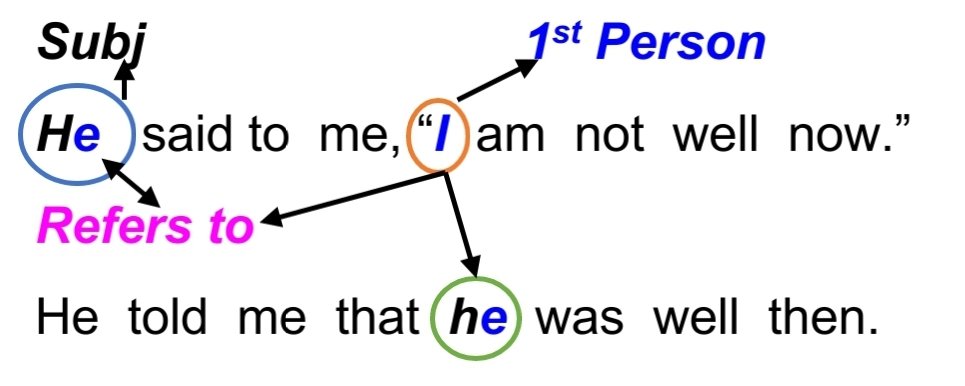
| Direct: She said to me, “I like to watch a movie.” Indirect: She told me that she liked to watch a movie. |
| Direct: You said to me, “I want to take this pen.” Indirect: You told me that you wanted to take that pen. |
(2) Second Person: If the Subject of the Reported speech in Direct Narration is in the 2nd Person, it is replaced with the Object of the Reporting Verb in Indirect narration.
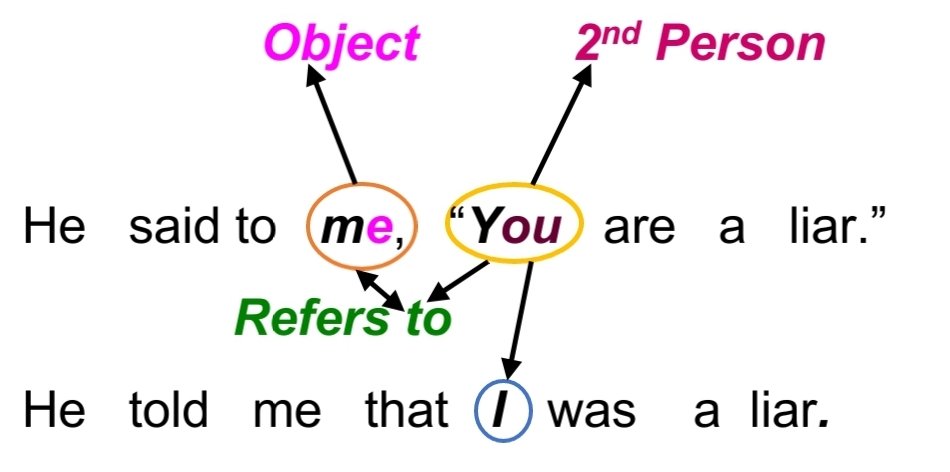
| Direct: You say to her, “You are a liar.” Indirect: You tell her that she is a liar. |
| Direct: The teacher will say to them, “You are all naughty.” Indirect: The teacher will tell them that they are all naughty. |
(3) Third Person: If the Subject of the Reported speech in Direct Narration is in the 3rd Person, There will be no change the in Indirect narration.
| Direct: He said to me, “He can paint very well.” Indirect: He told me that he could paint very well. |
D. Punctuation Marks Rules for Class 7
Direct Speech: Uses quotation marks, and commas.
Indirect Speech: No quotation marks; integrates the sentence smoothly.
Examples:
| Direct: “I am learning English,” he said. Indirect: He said that he was learning English. |
E. Modals and Conditional Rules for Class 7
Modal Changes: Can to could, will to would, shall to should, etc.
Examples:
| Direct: She said, “I can swim.” Indirect: She said that she could swim. |
| Direct: He said, “I will finish it tomorrow.” Indirect: He said that he would finish it the next day. |
F. Modifying Words Rules
Time and Place Adjustments: Now to then, today to that day, here to there, etc.
Examples:
| Direct: He said, “I will see you here tomorrow.” Indirect: He said that he would see me there the next day. |
Assertive Sentences Rules for Narration Change Class 7
Following Rules to be observed carefully before going to change the mode of narration of the Assertive sentence.
1. The comma (,) and inverted comma (“… ”) are removed in Indirect Narration. Use Full stop ( . ) at the end of the sentence in Indirect Narration.
2. Reporting Verb ‘say’ / ‘say to’ / ‘said’ / ‘said to’ in Direct Narration changed to ‘say’ / ‘tell’ / ‘said’ / ‘told’ in Indirect Narration.
3. Connective ‘that’ is added before the Reported Speech in Indirect Narration.
4. Read: Rules to change other words.
Now, explore the following pictograph to understand the Narration Change of Assertive Sentences in a better way.
a. Understanding Assertive Sentences Narration Change
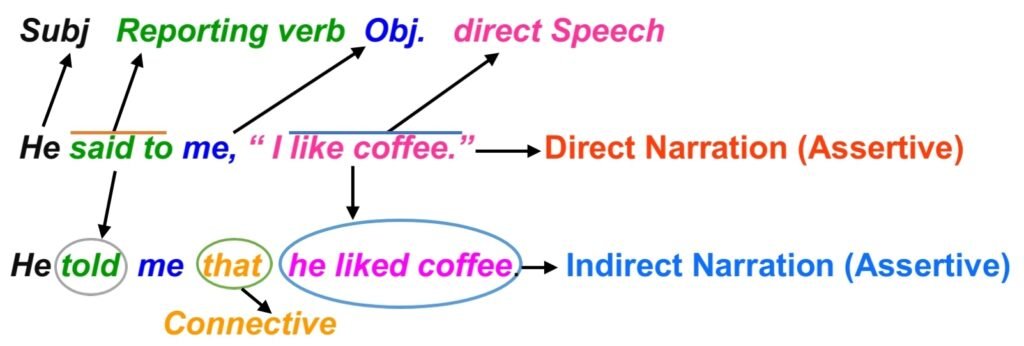
b. Workout Examples of Assertive Sentences Narration Change.
Direct: She said, “I am unwell.
Indirect: She said that she was unwell.
Direct: Babu said, “I am very busy now.”
Indirect: Babu said that he was very busy then.
Direct: He said, “Mother is cooking curry.”
Indirect: He said that his mother was cooking curry.
Direct: She said, “I have passed the exams.
Indirect: She said that she had passed the exams.
Direct: He said, “The dog died last night.”
Indirect: He said that that dog had died the previous night.
Direct: “I know her home”, said Hena.
Indirect: Hena said that she knew her home.
Direct: He said that Hindi was easy to learn.
Indirect: “Hindi is easy to learn.” said he.
Direct: He said that he didn’t like me.
Indirect: He said to me, “I don’t like you.”
Direct: Tina said that she was very tired.
Indirect: Tina said, “I was very tired.”
Direct: She said that she could not do it then.
Indirect: She said, “I cannot do it now.”
c. Assertive Sentences Narration Change Exercise with Answers
Change the mode of Narration of the following sentences.
Q.1. The teacher said, “Ice is solid water.”
Ans: The teacher said that ice is solid water. ( universal truth)
Q.2. I said to you, “You are right.”
Ans: I told you that you were right.
Q.3. You said to me, “I have seen a lion.”
Ans: You told me that you had seen a lion.
Q.4. You said, “I am an early riser.”
Ans: You said that you were an early riser.
Q.5. The wolf said, “I am having a very bad time.”
Ans: The wolf said that he was having a very bad time.
Q.6. He said, “It is my house.”
Ans: He said that it was his house.
Q.7. You said, “I am at cricket now.”
Ans: You said that you were at cricket then.
Q.8. I say, “I saw a blue bird.”
Ans: I say that I saw a bluebird.
Q.9. He said, “I will not do it.”
Ans: He said that he would not do it.
Q.10. He said to her, “You are wrong.”
Ans: He told her that she was wrong.
d. Assertive Sentences Narration Change Worksheet with Answers
Change the form of Narration of the following sentences
Q.1. She said that she would do it the next day.
Ans: She said, “I will do it tomorrow.”
Q.2. The child will say that the child (he/she) is hungry.
Ans: The child will say, “I am hungry.”
Q.3. The teacher said that one and one are two.
Ans: “One and one are two”, said the teacher.
Q.4. She said that she liked coffee.
Ans: She said, “I like coffee.”
Q.5. He told you that you were fit.
Ans: He said to you, “You are fit.”
Q.6. Father said that Honesty is the best policy.
Ans: Father said, “Honesty is the best policy.”
Q.7. The girl said that aunty loved them.
Ans: “Aunty loves us”, said the girl.”
Q.8. She said that her mother knew everything.
Ans: She said, “Mother knows everything.”
Q.9. The dog told the wolf that his master was kind.
Ans: The dog said to the wolf, “My master is kind.”
Q.10. The wolf said that he preferred his freedom to his fat.
Ans: The wolf said, “I prefer my freedom to your fat.”
Interrogative Sentences Rules for Narration Change Class 7
Following Rules to be observed carefully before going to change the mode of narration of the Interrogative sentence.
1. The comma (,), inverted comma (“… ”), and question mark (?) are removed in Indirect Narration. Use Full stop ( . ) at the end of the sentence in Indirect Narration. That means the Direct speech will be in the Assertive Form in Indirect Narration.
2. Reporting Verb ‘say’ / ‘say to’ / ‘said’ / ‘said to’ in Direct Narration changed to ‘ask’ / ‘ask’ / ‘asked’ / ‘asked’ in Indirect Narration. Sometimes, ‘enquire’, and ‘want to know’ can be used as Reporting Verb in Indirect Narration.
3. Connective ‘if/whether’ added before Reported Speech in Indirect Narration, if Direct speech is not introduced with ‘wh-word’ – ‘who’, ‘which’, ‘what’, ‘when’, ‘where’, ‘why’, ‘whose’, ‘how’. Otherwise, the ‘wh-word’ would be the connective with which the Direct speech is introduced in Direct Narration.
4. Read Rules to change other words.
Now, explore the following pictograph to understand the Narration Change of Interrogative Sentences in a better way.
a. Understanding Interrogative Sentences Narration Change for Class 7
(i) Interrogative Sentence without “wh-word”
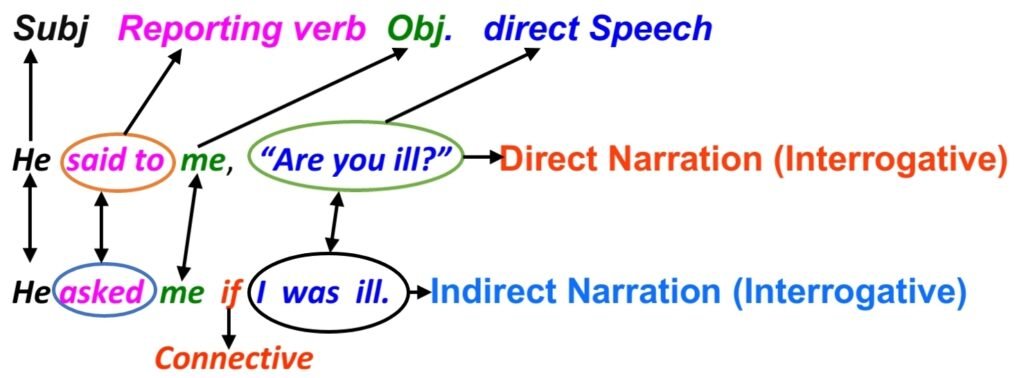
(ii) Interrogative Sentence with “wh-word”
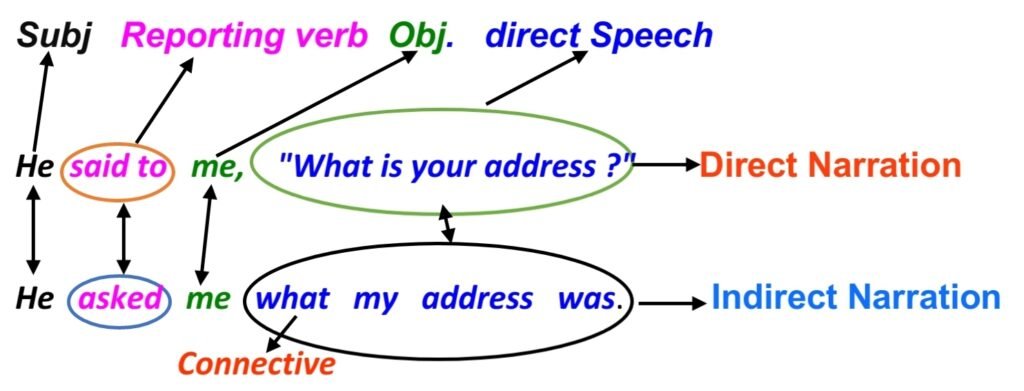
b. Workout Examples of Interrogative Sentences.
Direct: Mother said, “Do you feel better?”
Indirect: Mother asked if I felt better.
Direct: She said, “Shall I start tomorrow?”
Indirect: She asked if She would start the next day.
Direct: Miss said to me, “Did you learn the lesson?”
Indirect: Miss asked me if I had learned the lesson.
Direct: “Is there any hope ?” said the patient
Indirect: The patient asked if there was any hope.
Direct: He said to her, “Will you come with me?”
Indirect: He asked her if she would come with him.
Direct: She said to me, “Can you speak English ?”
Indirect: She asked me if I could speak English.
Direct: He said to me, “What is your address ?”
Indirect: He asked me what my address was.
Direct: She said, “Shall I start tomorrow?”
Indirect: She asked if she would the next day.
Direct: He said to her, “Have you a TV?
Indirect: He asked her if she had a TV.
Direct: She said, “What are you looking at ?”
Indirect: She asked what I was looking at.
Direct: He said to her, “What is your father ?”
Indirect: He asked her what her father was.
Direct: Mother said, “Will you lie ?”
Indirect: Mother asked if I would lie.
Direct: He said, “Are the mangoes ripe?”
Indirect: He asked if the mangoes were ripe.
Direct: Father said to his son, “Are you ready?”
Indirect: Father asked his son if he was ready.
Direct: She said to me, “Have you done it?”
Indirect: She asked me if I had done it.
c. Interrogative Sentences Exercise with Answers
Change the mode of Narration of the following sentences.
1. The police said, “Do you know the thief ?”
Ans: The police asked if I knew the thief.
2. He said, “Will you come tomorrow ?”
Ans: He asked if she would come the next day.
3. “When will the next train come?” said he.
Ans: He asked when the next train would come.
4. She said, “Has he done his task ?”
Ans: She asked if he had done his task.
5. He said to me, “Where do you live ?”
Ans: He asked me where I lived.
6. “Why were you absent yesterday?” said he.
Ans: He asked why I was absent the previous day.
7. He asked me, “How did you do the sum ?”
Ans: He asked me how I did the sum.
8. The girl said, “Where did you keep the pen?
Ans: The girl asked where I had kept the pen.
9. She said to me, “Why have you told it ?”
Ans: She asked me why I had told it.
10. The police said to him, “Why did you lie ?”
Ans: The police asked him why he lied.
d. Interrogative Sentences Worksheet with Answers
Change the mode of Narration of the following sentences.
1. ‘Why are you absent?’ said the teacher.
Ans: The teacher asked why I was absent.
2. I said to him, “Why are you angry?”
Ans: I asked him why I was angry.
3. She said to me, “How did you do the sum ?”
Ans: She asked me how I did the sum.
4. He said to me, “Where did you come from?”
Ans: He asked me where I had come from.
5. The girl said, “Whom do you love ?”
Ans: The girl asked whom I loved.
6. She asked where her handbag was.
Ans: She said, “Where is your handbag?”
7. “How is it that you look so sleek ?” said the wolf.
Ans: The wolf asked how was that he looked so sleek.
8. I said to you, “Where do you live ?”
Ans: I asked you where you lived.
9. He said to me, “How did you do it ?”
Ans: He asked me how I had done it.
10. She said to me, “How old are you?”
Ans: She asked me how old I was.
11. He said, “What is your father ?”
Ans: He asked what my father was.
12. “When will the train come?” she said to me.
Ans: She asked me when the train would come.
Imperative Sentences Rules for Narration Change Class 7
Following Rules to be observed carefully before going to change the mode of narration of Imperative Sentences.
1. The comma (,), and inverted commas (“… ”), are removed in Indirect Narration. Use Full stop ( . ) at the end of the sentence in Indirect Narration. That means the Direct speech will be in the Assertive Form in Indirect Narration.
2. Reporting Verb ‘say’ / ‘say to’ / ‘said’ / ‘said to’ in Direct Narration changed to ‘request’ / ‘advise’ / ‘order’ / in Indirect Narration according to sense. Sometimes, ‘tell’, can be used as Reporting Verb in Indirect Narration when the sense is not clear.
3. Connective ‘to’ added before Reported Speech in Indirect Narration.
4. Read Rules to change other words.
Now, explore the following pictograph to understand the Narration Change of Imperative Sentences in a better way.
a. Understanding Imperative Sentences Narration Change Class 7
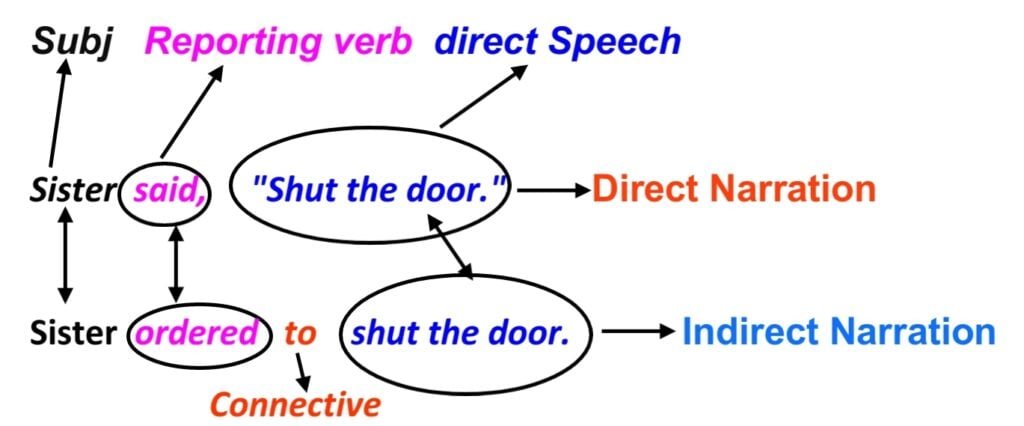
b. Workout Examples of Imperative Sentences.
Direct: Sister said, “Shut the door.”
Indirect: Sister ordered to shut the door.
Direct: She said to me, “Obey your teacher”.
Indirect: She advised me to obey my teacher.
Direct: He said to me, “Do as I tell you.”
Indirect: He ordered me to do as he told me
Direct: She said to him, “Go away.”
Indirect: She ordered him to go away.
Direct: “Call the thief”, said the Judge.
Indirect: The judge ordered to call the chief.
c. Imperative Sentences Exercise with Answers
1. She said, “Please wait here.”
Ans: She requested to wait there.
2. The teacher said, “Boys, go to the class.”
Ans: The teacher ordered the boys to go to the class.
3. She said, “Wait till I come.”
Ans: She told me to wait till he came.
4. Mother said, “Don’t get wet.”
Ans: Mother advised not to get wait.
5. She shouted, “Stop the taxi.”
Ans: She shouted to stop the taxi.
6. The Miss said, “Answer your roll call.”
Ans: The Miss ordered to answer our roll call.
7. Father said to his son, “Never tell a lie.”
Ans: Father advised his son never to tell a lie.
8. She said, “Be quiet.”
Ans: She ordered to be quiet.
9. He said, “Don’t play with fire.”
Ans: He advised me not to play with fire.
10. “Follow me”, said the house dog.
Ans: The house dog told me to follow him.
11. “Come with me to my master’s house”, said the dog.
Ans: The dog said to go with him to his master’s house.
Optative Sentences Rules for Narration Change Class 7
Optative sentences express wishes, prayers, or hopes. When converting these sentences from direct to indirect speech, follow these rules:
(i) Use appropriate verbs like “wished,” “prayed,” or “hoped” instead of “said.”
(ii) Change pronouns to fit the context of the reported speech.
(iii) Optative verbs like “may” and “might” often remain the same, but the structure of the sentence may change.
(iv) Remove Quotation Marks and Commas
(v) Make necessary adjustments to time and place expressions, though they are less common in optative sentences.
a. Workout Examples of Optative Sentences.
1. He said, “May you succeed!”
Ans: He wished that I might succeed.
2. She said, “May you be happy!”
Ans: She wished that I might be happy.
3. They said, “May peace prevail!”
Ans: They prayed that peace might prevail.
4. He said, “May you find joy!”
Ans: He hoped that I might find joy.
5. She said, “May you be here next year!”
Ans: She wished that I might be there the following year.
b. Optative Sentences Narration Change Exercise with Answers
Direct: He said, “May you have a wonderful journey!”
Indirect: He wished that I might have a wonderful journey.
Direct: She said, “May God bless you!”
Indirect: She prayed that God might bless me.
Direct: They said, “May you recover soon!”
Indirect: They wished that I might recover soon.
Direct: The teacher said, “May you all pass the exam!”
Indirect: The teacher hoped that we all might pass the exam.
Direct: John said, “May your dreams come true!”
Indirect: John wished that my dreams might come true.
Exclamatory Sentences Rules for Narration Change Class 7
Exclamatory sentences express strong emotions such as surprise, joy, anger, or sorrow. When converting these sentences from direct to indirect speech, follow these rules:
(i) Use appropriate reporting verbs like “exclaimed,” “cried,” “shouted,” or “remarked” to convey the emotion.
(ii) Convert the exclamatory sentence into a statement.
(iii) Remove Exclamation Marks and Commas
(iv) Change pronouns to fit the context of the reported speech.
(v) Make necessary adjustments to time and place expressions, though they are less common in exclamatory sentences.
a. Workout Examples of Exclamatory Sentences.
Direct: He said, “Wow, what a beautiful view!”
Indirect: He exclaimed that it was a beautiful view.
Direct: She said, “Oh no, I forgot my keys!”
Indirect: She exclaimed that she had forgotten her keys.
Direct: They said, “Hooray! We won the match!”
Indirect: They exclaimed with joy that they had won the match.
Direct: He said, “What a terrible mistake I made!”
Indirect: He exclaimed that he had made a terrible mistake.
Direct: She said, “How lovely this place looks in spring!”
Indirect: She exclaimed how lovely that place looked in spring.
b. Exclamatory Sentences Narration Change Exercise with Answers
1. She said, “What a wonderful surprise!”
Ans: She exclaimed that it was a wonderful surprise.
2. He said, “How beautiful the sunset is!”
Ans: He exclaimed that the sunset was beautiful.
3. They said, “Alas, we have lost the game!”
Ans: They exclaimed with sorrow that they had lost the game.
4. John said, “Oh, I can’t believe I won the lottery!”
Ans: John exclaimed that he couldn’t believe he had won the lottery.
5. Mary said, “What a delicious meal this is!”
Ans: Mary exclaimed that it was a delicious meal.
Note: More about Optative and Exclamatory sentence Narration Change has been discussed in class 8.



